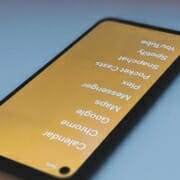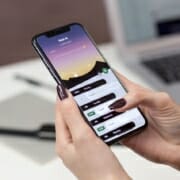4 Reasons Why Retailers Should Be Using Mobile Apps
Retailers don’t have it easy, as they need to navigate a competitive and uncertain business environment. And considering how much Covid-19 has impacted the retail space, the old ways of doing business no longer apply.
So what should business leaders do to sail the rough seas and come out ahead on the other side?
Firstly, all business leaders should learn about and embrace the latest mobile technologies. Secondly, they should assess how these technologies will fit their business needs and fulfill goals. And thirdly, they should work with an experienced developer, such as NS804, to create the right solutions for their needs.
For retailers, mobile apps can radically transform their businesses for the better. These apps can automate and enhance specific business processes, excite and expand the customer base, and introduce several m-commerce opportunities.
But it’s not only brick and mortar businesses that can benefit from mobile apps but also online retailers. And by online retailers, we don’t only mean those that sell and ship physical goods but also those that sell digital products. The versatility of mobile apps makes them ideal for a variety of businesses.
Now, we understand that it’s not always easy to pinpoint how mobile apps can serve your business. So we’ve compiled this handy list to help you identify the pain points your business and customers may experience and how mobile apps can mitigate or solve these issues.
1. Build An Ecosystem That Serves Your Business Entirely
Have you noticed how big tech companies have built walled gardens to herd their customers? Apple, Google, Microsoft, and others have gained tremendous leverage by locking users into their platforms. And even smaller players such as Funimation, Netflix, and Spotify have monopolized specific segments of the media streaming market.
Sure, all these platforms offer numerous opportunities for savvy businesses. But consider for a minute that you’re running an indie record label that has signed up several promising artists. You decide to make available recordings of these artists on iTunes, Spotify, and YouTube Music. And this isn’t necessarily a bad move, as all these platforms have huge audiences you can reach.
However, you’re also driving business to these platforms, diminishing your brand, and limiting your potential revenue. And that’s because your customers can only get hold of your music on these platforms and not directly from you. Furthermore, the branding of each platform holder will always overshadow your brand. And with streaming services such as Spotify, you’ll receive a pittance every time a user streams songs from one of your artists.
The good news is that you can avoid all these issues by building a mobile app that your customers can download. Within the app, you may allow your customers to download or stream music and even purchase physical copies (on CD, tape, and vinyl) of albums. And any time you release a new album, you can notify your customers via in-app and pop-up notifications.
Ultimately, you’ll establish an ecosystem that serves your business and yours alone, which means that your customers remain yours. And a third party doesn’t get to determine how much you can earn, how you market your music, and how you reach fans.
2. Increase Your Cross-Selling Capabilities
Let’s stick to the indie record label example for now. And let’s consider how a mobile app can increase cross-selling of your products.
But you may ask, “How does cross-selling benefit a record label?”
It’s likely that fans will want to purchase merchandise such as caps, t-shirts, and posters of their favorite artists. It’s even possible to upsell, such as enticing a fan that has added a digital album to the cart to purchase the limited-edition vinyl release at a reduced price.
And how you go about cross-selling merchandise can take several forms with a mobile app.
You may notify fans with in-app and pop-up notifications whenever you have new merchandise available. And if these fans have opted in to receive emails, you can cross-sell merchandise via this additional avenue. When done right, an email marketing strategy can effectively drive customers down the sales funnel.
But since your mobile app will also have a database on the backend, you’ll have an accurate record of all your customers’ purchases. For customers that have bought one or more albums of a particular artist, you can target these customers specifically with merchandise. Thus, you don’t have to waste your marketing efforts on customers that prefer other artists or don’t bother purchasing merchandise.
Another way this data may aid you is by identifying the locations of your most loyal customers. And if you have the necessary funds available, you may decide to have artists perform gigs at these locations and set up a merchandising table at all live venues.
You may also set up a pop-up shop at a fair or mall for short-term selling and cross-selling purposes. In all cases, your app will serve as the hub to inform fans and merge your digital and physical endeavors.
3. AR & VR Benefits Clothing Retailers
Now let’s shift gears and focus on a more traditional business, such as a clothing retailer. If you’re running such a business, it’s likely that you’re operating out of a physical location such as a store in a mall or shopping street. And most, if not all of your customers, need to visit your store to try on and purchase your clothes and accessories.
While this is a common way clothing retailers do business, it’s not very efficient or forward-looking. But what will it take to change course and deliver a more convenient shopping experience to your customers? Thanks to the advent of augmented reality (AR) and virtual reality (VR), it’s now possible to serve customers that live far away from your store.
You can craft a mobile app with AR or VR functionality that contains accurate 3D models of all the clothes and accessories you have in stock. And if the app has AR functionality, it will utilize the accelerometer and cameras of the phone to detect the customer’s physical form, angle, and view orientation.
Then, the customer will pick a clothing item displayed on the app, which will then show the item superimposed on top of the customer on the phone’s screen. The customer will also have the ability to adjust the fit, size, and color (if available) of the item on the fly. Once the customer is happy with how the item looks on them, they can add it to their cart or initiate a one-click purchase.
Now, you can ship the order and conduct an in-app survey soon after the customer receives the item to ascertain their satisfaction or lack thereof. Having this information will help you make changes to the products you offer and service levels if necessary.
4. Mobile Apps Power Up Fast-Food Restaurants
Finally, let’s focus on fast-food retailers of all shapes and sizes. Mobile apps have already proven their worth in this particular market segment. And with the many excellent food delivery apps available, customers have a growing appetite for quick and convenient food purchases.
A well-conceived fast-food mobile app allows customers to view an outlet’s menu and place orders with as few clicks as possible. Furthermore, all food items, descriptions, prices, images, and UI elements must be clear and crisp so that elderly customers and those with vision impairments can easily discern these and place orders.
But this mobile app isn’t only for placing orders, it’s also a powerful promotional tool. Instead of printing thousands of expensive full-color glossy flyers, you can promote your latest gourmet burger directly inside your app. Moreover, you can utilize animations, motion graphics, sounds, and a step-by-step video of how you make your gourmet burgers.
Not only is this more impactful than using printed materials, but customers can also tap on this visual promo, which will take them directly to the checkout page to complete their order. And that’s powerful because fast-food restaurants rely heavily on impulse sales.
In Conclusion
Traditional brick-and-mortar businesses through to online retailers can all benefit from having their own custom mobile app. The examples we’ve described above present a few of the possibilities that help enhance businesses. Contact NS804 to learn how we’ll help you create a mobile app that can transform your retail business for the better!













Leave a Reply
Want to join the discussion?Feel free to contribute!